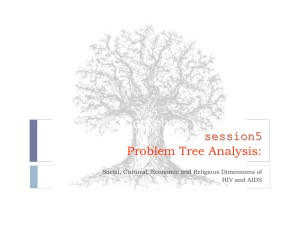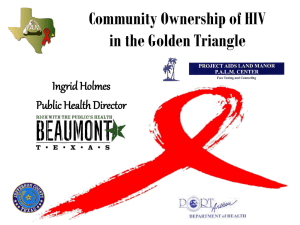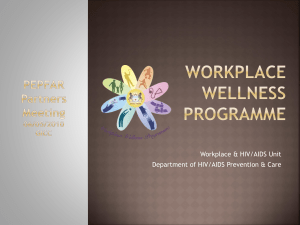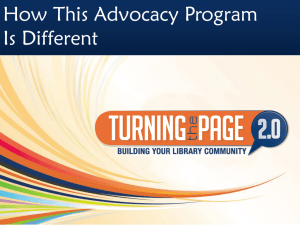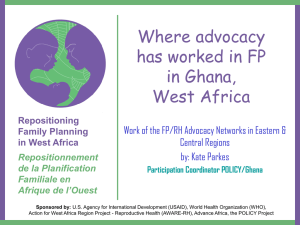Click Here for PowerPoint Presentation Slides
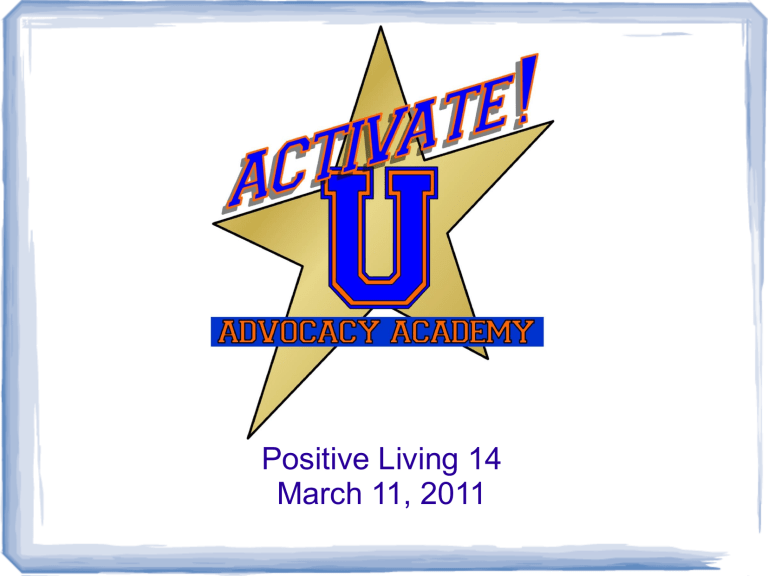
Positive Living 14
March 11, 2011
You spoke, we listened!
More time for open discussion.
Keep meeting on schedule.
Record unplanned issues that arise, on-the-fly.
More breaks.
Wish granted.
Ground Rules
We agree to strive to stay on schedule.
We will respect break time.
We all come back from breaks on-time.
We refrain from personal attacks.
When we voice a criticism, we offer a solution or improvement along with it.
If we need to move on because we’ll “Park it!”
The “Park It!” Lady
Positive Living 14
March 11, 2011
Legacy of Advocacy:
Where we've been; what we've done.
Butch McKay
Jesse Fry
The Legacy of HIV/AIDS Advocacy:
• Changed the rules for drug discovery, development and approval for life-threatening illnesses
• Convinced researchers to provide early access to experimental drugs
• Empowered patient to be leaders in the fight against disease, not victims of it.
• Defined how to influence scientists, academics, bureaucrats, legislators and presidents without making them enemies.
Source: Martin Delaney
What advocacy has done for
Floridians living with HIV and AIDS:
• Preserved exemption of HIV drug class from
Medicaid Preferred Drug List (PDL) management.
• Advocates played a pivotal role in shaping and advising Project AIDS Care (PAC) waiver program
• Convinced Florida Medicaid (AHCA),Governor,
Florida Legislature that state-of-the-art HIV drug resistance testing is vital to good care
• Fended off Medicaid capitation rates for
HIV/AIDS
Group Interaction
What are some successes enjoyed by other states that come to mind?
Can you share any examples of when a situation looked bleak and advocacy by people living with HIV and AIDS helped get to a solution?
Advocacy vs. Lobbying ACID TEST
To be considered advocacy, and not lobbying, the answer must be “no” to both of the following questions:
1.Does this message ask for specific action, such as a vote on a bill or amendment?
2.Does this message ask for support of a specific dollar amount, such as a budget increase or appropriation?
Education is not Lobbying
• Keeping a member informed about waiting lists and the consequences, opportunity costs?
• Comparing cost of care through AICP or
ADAP to Florida Medicaid costs?
• Facts about HIV drug resistance and dangers of unplanned interruptions in treatment?
• Presenting cost/benefit analysis?
• Comparing past budgets to utilization data?
• Suggestions for solutions?
Your Individual, Independent Voice
First and foremost, you are a private citizen.
You are free to advocate your own, personal views.
Our country’s system of government is a
Constitutional Republic.
The people you elect to represent you in government carry your views into the lawmaking process.
Don’t feel restricted by a groups particular viewpoint; advocate your views as you see fit!
Refining Your Role as an HIV/AIDS Advocate
Main Objectives
Stay Connected!
Advocacy Tools
Letter Writing Ideas
Coming Up: Letter writing group activity…
Refining Your Role as an HIV/AIDS Advocate
Your main objectives:
1. Strive to become a source of information for law and policy makers.
2. Develop one-to-one relationships with the people you elect to represent.
3. Strive for a degree of professionalism and sophistication that sets you apart from the crowd.
Refining Your Role:
Stay Connected!
Network within a group that helps you keep upto-date on advocacy issues.
How many of us are members of a Ryan White
Consortium and/or Planning Council?
Sign up as a member of your state’s HIV/AIDS advocacy group.
In Florida, it’s Florida HIV/AIDS Advocacy
Network, or FHAAN.
What other states represented today have advocacy groups?
Refining Your Role:
Stay Connected!
How do I get connected to other advocates in my state?
Southern AIDS Coalition is a good place to start!
Let’s hear from their Executive Director:
Patrick Packer
Refining Your Role:
Stay Connected!
Patrick Packer
Executive Director
Southern AIDS Coalition patrickpacker@gmail.com
Refining Your Role:
Project Vote Smart
Go to votesmart.org and build a contact file for each of your elected officials and keep the information up-to-date.
How do you keep up with how your elected officials are voting?
Use votesmart.org to learn background details and voting history.
Let’s try it: Make a wireless connection and look up information on votesmart.org
Refining Your Role:
Project Vote Smart
Let’s try it together!
Go to: votesmart.org
www.votesmart.org
Refining Your Role:
Read, read, read, read, read!
1. Newspapers! …not just print anymore
2. Alerts and research sent to you by your state advocacy network.
3. The Internet, a word of caution.
4. Press releases, more caution, still.
5. Internet News Readers…
…let’s break this down.
Use a News Reader, like Google
Anyone using a News Reader right now?
What do you like about it?
What do you dislike?
Use a News Reader, like Google
A News Reader is an Internet-based research tool that uses a Search Engine to return news stories based on Keywords.
For example, let’s say you’re doing research on the soccer player, Ronaldo Cristiano…
You might enter “Ronaldo Cristiano shirtless” for instance…
I’m just pulling that out of the thin air, as an example…you know, just for discussion…
Or maybe “Ronaldo Cristiano in his underwear”
Use a News Reader, like Google
Or perhaps, something like “Ronaldo Cristiano taking his shirt off"
Use a News Reader, like Google
Get the idea?
I thought so…
Anyway, so, News Readers…check ‘em out.
Have some fun with it; don’t expect great answers to be returned, right away; experiment with different keywords.
Now, get to work and stop searching for pictures of Ronaldo Cristiano!
AIDS Insurance Continuation Program (AICP)
Briefing by Rick Vitale, Jackson Co. Health Dept.
AICP sustains private health insurance coverage for PLWH at risk of losing it
Key advantage: Patient stays with her established care team, including her nurses and pharmacist
More patient-driven options for primary care
About two-thirds of AICP clients medically and financially qualified for Florida Medicaid
Letter Writing Skills-Building
The Blank Page Syndrome:
Terrifying writers since 10,000 B.C.
Write about issues you are passionate about!
Don’t start from scratch!
Use your research tools to give you ideas!
Turn “Action Alerts” and other advocacy appeals into your own letters and messages.
Letter Writing Skills-Building
Let’s write a letter together!
1.
We’re going to divide up at teams of two tables each.
2. Each table team will get a card.
3. Each card has one type of elected official, like
“State Legislator”
4. Each card has one issue, like “Medicaid
Reform”
Letter Writing Skills-Building
Here’s what we’ll do:
1. Choose a person to be the leader, and one to be the recorder.
2. Choose one person the letter is coming from.
Then as a group decide:
3. What research do we need to do and from what resource will we get it?
4 . What’s the message we want to deliver?
5. Which approaches should we use to deliver the message?
What’s next? Workshop Preview
What’s next? Workshop Preview
Wrap-up Discussion and Evaluations
What was your favorite part of today?
Are you more motivated to write to your elected officials than you were yesterday?
What do you think we should do next time?
Let’s complete our evaluation forms…



